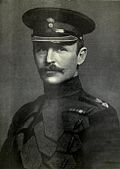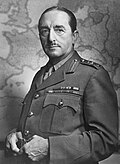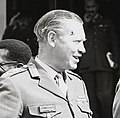| No. | Portrait | Name | Took office | Left office | Time in office | Ref. |
|---|
| Chiefs of the General Staff |
|---|
| 1 | | Lyttelton, Neville General
Sir Neville Lyttelton
(1845–1931) | 12 February 1904 | 2 April 1908 | 4 years, 50 days | [5] |
| 2 | | Nicholson, William Field Marshal
Sir William Nicholson
(1845–1918) | 2 April 1908 | 22 November 1909 | 1 year, 234 days | [6] |
| Chiefs of the Imperial General Staff |
|---|
| 2 | | Nicholson, WilliamField Marshal
Sir William Nicholson
(1845–1918) | 22 November 1909 | 15 March 1912 | 2 years, 114 days | [7] |
| 3 | | French, JohnField Marshal
Sir John French
(1852–1925) | 15 March 1912 | 6 April 1914 | 2 years, 22 days | [8] |
| 4 | | French, JohnGeneral
Sir Charles Douglas
(1850–1914) | 6 April 1914 | 25 October 1914 † | 202 days | [9] |
| 5 | | Murray, James Lieutenant General
Sir James Wolfe Murray
(1853–1919) | 25 October 1914 | 26 September 1915 | 1 year, 154 days | [10] |
| 6 | | Murray, ArchibaldLieutenant-General
Sir Archibald Murray
(1860–1945) | 26 September 1915 | 23 December 1915 | 88 days | [11] |
| 7 | | Robertson, WilliamGeneral
Sir William Robertson
(1860–1933) | 23 December 1915 | 19 February 1918 | 2 years, 58 days | [12] |
| 8 | | Wilson, HenryField Marshal
Sir Henry Wilson
(1864–1922) | 19 February 1918 | 19 February 1922 | 4 years | [13] |
| 9 | | Lambart, RudolphField Marshal
Rudolph Lambart, 10th Earl of Cavan
(1865–1946) | 19 February 1922 | 19 February 1926 | 4 years | [14] |
| 10 | | Milne, GeorgeField Marshal
Sir George Milne
(1866–1948) | 19 February 1926 | 19 February 1933 | 7 years | [15] |
| 11 | | Montgomery, ArchibaldField Marshal
Sir Archibald Montgomery-Massingberd
(1871–1947) | 19 February 1933 | 15 May 1936 | 3 years, 86 days | [16] |
| 12 | | Deverell, CyrilField Marshal
Sir Cyril Deverell
(1874–1947) | 15 May 1936 | 6 December 1937 | 1 year, 205 days | [17] |
| 13 | | Vereker, JohnGeneral
John Vereker, 6th Viscount Gort
(1886–1946) | 6 December 1937 | 3 September 1939 | 1 year, 271 days | [18] |
| 14 | | Ironside, EdmundGeneral
Sir Edmund Ironside
(1880–1959) | 4 September 1939 | 26 May 1940 | 266 days | [19] |
| 15 | | Dill, JohnField Marshal
Sir John Dill
(1881–1944) | 26 May 1940 | 25 December 1941 | 1 year, 213 days | [20] |
| 16 | | Brooke, AlanField Marshal
Alan Brooke, 1st Viscount Alanbrooke
(1883–1963) | 25 December 1941 | 25 June 1946 | 4 years, 182 days | [21] |
| 17 | | Montgomery, BernardField Marshal
Bernard Montgomery, 1st Viscount Montgomery of Alamein
(1887–1976) | 26 June 1946 | 1 November 1948 | 2 years, 129 days | [21] [22] |
| 18 | | Slim, WilliamField Marshal
Sir William Slim
(1891–1970) | 1 November 1948 | 1 November 1952 | 4 years | [23] |
| 19 | | Harding, JohnField Marshal
Sir John Harding
(1896–1989) | 1 November 1952 | 29 September 1955 | 2 years, 332 days | [24] |
| 20 | | Templer, GeraldField Marshal
Sir Gerald Templer
(1898–1979) | 29 September 1955 | 29 September 1958 | 3 years | [25] |
| 21 | | Festing, FrancisField Marshal
Sir Francis Festing
(1902–1976) | 29 September 1958 | 1 November 1961 | 3 years, 33 days | [26] |
| 22 | | Hull, RichardGeneral
Sir Richard Hull
(1902–1989) | 1 November 1961 | April 1964 | 2 years, 5 months | [27] [28] [29] |
| Chiefs of the General Staff |
|---|
| 22 | | Hull, RichardField Marshal
Sir Richard Hull
(1902–1989)
[a] | April 1964 | 8 February 1965 | 10 months | - |
| 23 | | Cassels, JamesField Marshal
Sir James Cassels
(1907–1996) | 8 February 1965 | 1 March 1968 | 3 years, 22 days | [28] |
| 24 | | Baker, GeoffreyField Marshal
Sir Geoffrey Baker
(1912–1980)
[b] | 1 March 1968 | 1 April 1971 | 3 years, 31 days | [30] [31] [32] |
| 25 | | Carver, MichaelField Marshal
Sir Michael Carver
(1915–2001)
[a] | 1 April 1971 | 19 July 1973 | 2 years, 109 days | [33] [31] |
| 26 | | Hunt, PeterGeneral
Sir Peter Hunt
(1916–1988)
[b] | 19 July 1973 | 15 July 1976 | 2 years, 362 days | [34] [35] |
| 27 | | Gibbs, RolandField Marshal
Sir Roland Gibbs
(1921–2004)
[b] | 15 July 1976 | 14 July 1979 | 2 years, 364 days | [36] [37] |
| 28 | | Bramall, EdwinField Marshal
Sir Edwin Bramall
(1923–2019)
[a] | 14 July 1979 | 1 August 1982 | 3 years, 18 days | [38] [39] [40] |
| 29 | | Stanier, JohnField Marshal
Sir John Stanier
(1925–2007)
[b] | 1 August 1982 | 28 July 1985 | 2 years, 361 days | [35] [41] [42] |
| 30 | | Bagnall, NigelField Marshal
Sir Nigel Bagnall
(1927–2002) | 28 July 1985 | 10 September 1988 | 3 years, 44 days | [43] |
| 31 | | Chapple, JohnField Marshal
Sir John Chapple
(1931–2022) | 10 September 1988 | 14 February 1992 | 3 years, 157 days | [44] |
| 32 | | Inge, PeterGeneral
Sir Peter Inge
(1935–2022)
[a] [b] | 14 February 1992 | 15 March 1994 | 2 years, 29 days | [35] [45] [46] |
| 33 | | Guthrie, CharlesGeneral
Sir Charles Guthrie
(1938–2025)
[a] | 15 March 1994 | 3 February 1997 | 2 years, 325 days | [46] [47] |
| 34 | | Wheeler, RogerGeneral
Sir Roger Wheeler
(born 1941)
[b] | 3 February 1997 | 17 April 2000 | 3 years, 74 days | [48] [49] |
| 35 | | Walker, MichaelGeneral
Sir Michael Walker
(born 1944)
[a] | 17 April 2000 | 1 February 2003 | 2 years, 290 days | [50] [51] [52] |
| 36 | | Jackson, MikeGeneral
Sir Mike Jackson
(1944–2024) | 1 February 2003 | 29 August 2006 | 3 years, 209 days | [53] |
| 37 | | Dannatt, RichardGeneral
Sir Richard Dannatt
(born 1950)
[b] | 29 August 2006 | 28 August 2009 | 2 years, 364 days | [54] [55] |
| 38 | | Richards, DavidGeneral
Sir David Richards
(born 1952)
[a] | 28 August 2009 | 15 September 2010 | 1 year, 18 days | [56] [57] |
| 39 | | Wall, PeterGeneral
Sir Peter Wall
(born 1955) | 15 September 2010 | 5 September 2014 | 3 years, 355 days | [58] |
| 40 | | Carter, NickGeneral
Sir Nick Carter
(born 1959)
[a] | 5 September 2014 | 11 June 2018 | 3 years, 279 days | [59] |
| 41 | | Carleton, MarkGeneral
Sir Mark Carleton-Smith
(born 1964) | 11 June 2018 | 13 June 2022 | 4 years, 2 days | [60] |
| 42 | | Sanders, PatrickGeneral
Sir Patrick Sanders
(born 1966) | 13 June 2022 | 15 June 2024 | 2 years, 2 days | [61] |
| 43 | | Walker, RolandGeneral
Sir Roland Walker
(born 1970) | 15 June 2024 | Incumbent | 1 year, 123 days | [1] |






































